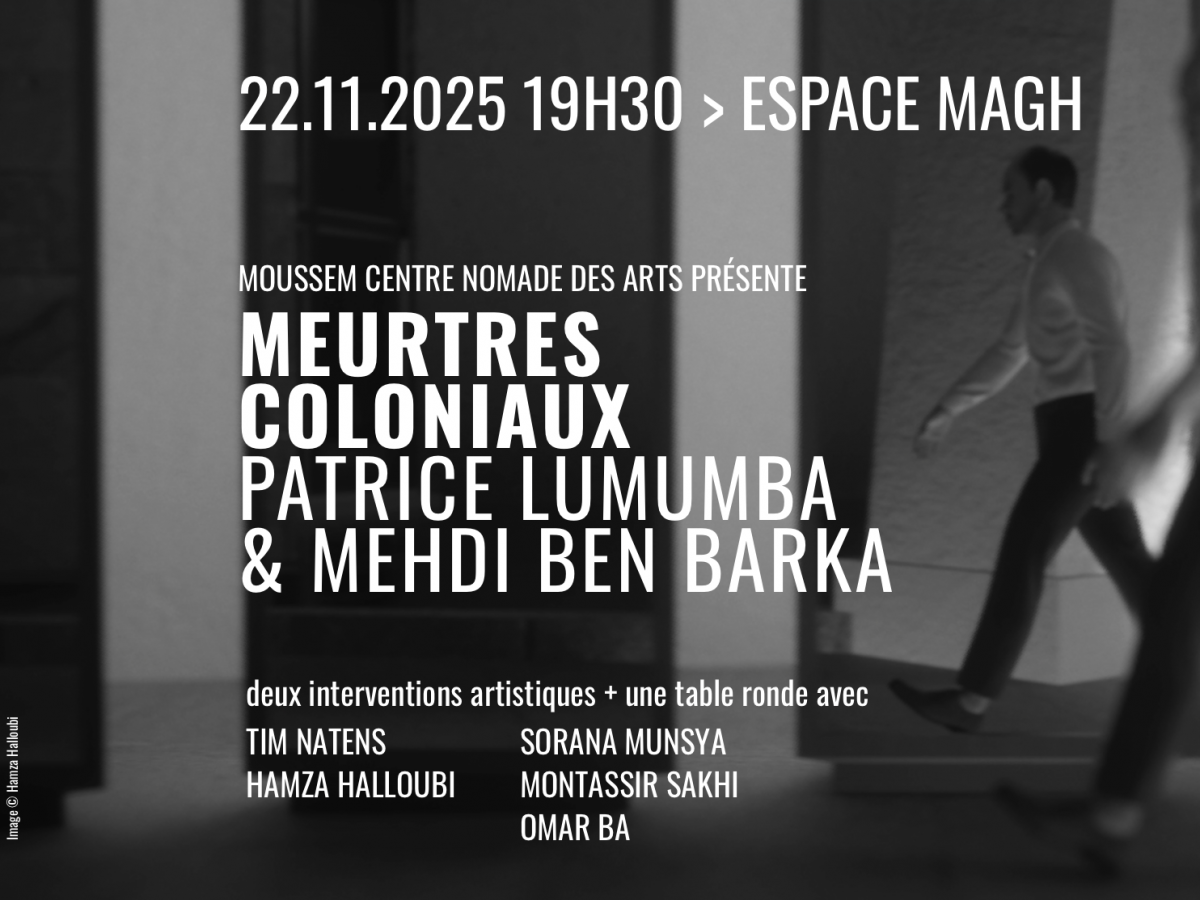
An evening dedicated to two central anti-colonial figures from our global history, both prominent advocates of pan-africanism: Patrice Lumumba (1925-1961) and Mehdi Ben Barka (1920-1965). Both were victims of a sinister elimination operation involving various intelligence services.
Two artists shed light on their brutal disappearance from different perspectives: director and performer Tim Natens opted for a theatrical monologue and visual artist Hamza Halloubi for a multimedia 3D installation. During this evening, produced by Moussem – Nomadic Arts Centre, these two artistic interventions will be shown and brought into dialogue with a panel discussion that unravels the historical context and lasting political repercussions of these two colonial murders. To this end, curator and independent writer Sorana Munsya and anthropologist Montassir Sakhi (KU Leuven, UM6P) will be in conversation with moderator Omar Ba (historian).
In Tand des Tijds (La dent dure), director and performer Tim Natens examines the execution of Patrice Lumumba, the first democratically elected prime minister of independent Congo. He focuses on the figure of Gerard Soete: the Belgian police commissioner who in 1961 was ordered to make Lumumba's body disappear and kept a few incisors as morbid private souvenirs. Originally a Dutch-language piece, Tim presents a mise-en-place in French for the first time (translation by Isabelle Grynberg).
In Its throat is parched with thirst, but it would not accept a single drop of water from alien hands, filmmaker Hamza Halloubi considers the body of Mehdi Ben Barka: a 10-minute animated 3D installation that piercingly questions us as viewers about capital, colonial power, and the conditions of possibility of art. With the spectral presence of this vanished revolutionary, Halloubi animates an alternative form of historiography in which fact and fiction intertwine. The film is subtitled in French.
Sorana Munsya, Montassir Sakhi and Omar Ba will discuss how Lumumba and Ben Barka embodied the transcontinental struggle against colonization. The widely divergent artistic strategies of Natens and Halloubi each highlight the profound differences and similarities between the political legacies of Lumumba and Ben Barka in the social but also specifically the anti-colonial militant memory. Taking the pan-African convictions of both revolutionaries as a starting point, the panel discussion will revisit the historical importance of the Bandung Conference (1955) and the Tricontinental Conference (1966), as well as the still-present legacy of colonial division between North and South.
The panel discussion will be held in French and will conclude with an opportunity to ask questions in English or French to the speakers and artists.
In collaboration with: Espace Magh.
With support from: Vlaamse Gemeenschap & VGC.
Poster image © Hamza Halloubi
An evening dedicated to two central anti-colonial figures from our global history, both prominent advocates of pan-africanism: Patrice Lumumba (1925-1961) and Mehdi Ben Barka (1920-1965). Both were victims of a sinister elimination operation involving various intelligence services.
Two artists shed light on their brutal disappearance from different perspectives: director and performer Tim Natens opted for a theatrical monologue and visual artist Hamza Halloubi for a multimedia 3D installation. During this evening, produced by Moussem – Nomadic Arts Centre, these two artistic interventions will be shown and brought into dialogue with a panel discussion that unravels the historical context and lasting political repercussions of these two colonial murders. To this end, curator and independent writer Sorana Munsya and anthropologist Montassir Sakhi (KU Leuven, UM6P) will be in conversation with moderator Omar Ba (historian).
In Tand des Tijds (La dent dure), director and performer Tim Natens examines the execution of Patrice Lumumba, the first democratically elected prime minister of independent Congo. He focuses on the figure of Gerard Soete: the Belgian police commissioner who in 1961 was ordered to make Lumumba's body disappear and kept a few incisors as morbid private souvenirs. Originally a Dutch-language piece, Tim presents a mise-en-place in French for the first time (translation by Isabelle Grynberg).
In Its throat is parched with thirst, but it would not accept a single drop of water from alien hands, filmmaker Hamza Halloubi considers the body of Mehdi Ben Barka: a 10-minute animated 3D installation that piercingly questions us as viewers about capital, colonial power, and the conditions of possibility of art. With the spectral presence of this vanished revolutionary, Halloubi animates an alternative form of historiography in which fact and fiction intertwine. The film is subtitled in French.
Sorana Munsya, Montassir Sakhi and Omar Ba will discuss how Lumumba and Ben Barka embodied the transcontinental struggle against colonization. The widely divergent artistic strategies of Natens and Halloubi each highlight the profound differences and similarities between the political legacies of Lumumba and Ben Barka in the social but also specifically the anti-colonial militant memory. Taking the pan-African convictions of both revolutionaries as a starting point, the panel discussion will revisit the historical importance of the Bandung Conference (1955) and the Tricontinental Conference (1966), as well as the still-present legacy of colonial division between North and South.
The panel discussion will be held in French and will conclude with an opportunity to ask questions in English or French to the speakers and artists.